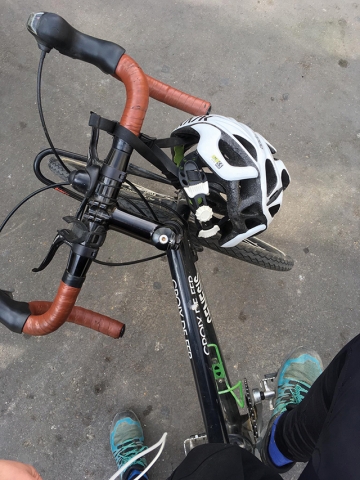Isolation Diaries #3 – When the Bikes Took Over
BLOG
I never imagined that I would ever ride my bike down Rustaveli Avenue, with no cars in sight. Last weekend, the government enforced a ban on vehicles in an attempt to slow the coronavirus spread over Easter, making the streets a cyclist’s realm.
I pushed hard into my pedals, flying down Chavchavadze Avenue, the wind tugging at my jacket and my hair. I love to cycle, so this was pure freedom and joy. I exchanged sideways, knowing, glances with other cyclists as we crossed paths. The roads belonged to cyclists now. If only Tbilisi could be traffic-free more often.
The fall in pollution levels across the city is tangible. From the top of Mtatsminda, the haze has lifted from the mountains. I can see new details on Tbilisi’s rooftops, extending into the far edges of the city. Across the hillside, the Monument of Georgia is easy to pick out from the bright layered slopes.
I smile every time I see runners in the streets, and cyclists balancing bags of puri from their handlebars. It’s one small glimmer of positive change amongst all the gray.
Whilst this new sense of peace is also the harrowing silence of a crippled economy, it brings with it a fresh air. A sense that things don’t have to go back to how they were; they could be better.
On Wednesday, Tbilisi Mayor Kakha Kaladze discussed the possibility of continuing traffic-free days even after the ban is lifted. I would love to see roads pedestrianized for a few hours on a Sunday.
Although some people have criticized this idea as an attack on their personal freedom, I think it increases the freedom of the average, meaning those without cars can enjoy the streets, free from toxic fume-spewing vehicles.
Officials in Milan have announced a plan to improve cycling infrastructure post-lockdown by adding temporary cycling lanes. Tbilisi could consider following their example; Rustaveli Avenue and the main road by the river are ample big enough to add a bike lane. Although whether the crazy drivers would adhere to the markings or not is doubtful.
Many Georgians, the government included, breathed a sigh of relief once the Orthodox Easter weekend passed. The ban on cars was probably only introduced in an attempt to discourage people from travelling to churches and family to celebrate. The government couldn’t stand up to the Church to ban services, churches insisted they would remain open, so the last thing left was to make it harder for people to get there.
Monday morning, I watched a video of Georgians singing from their windows in Batumi, with candles in hand or on their windowsills. It was a beautiful example of how life and human spirit can go on, even when everything is locked down.
I find myself wondering more and more: what next? When will things return to normality, if we can return at all? Will things be better? Is this a chance to change things for the good? Or will we face a long period of economic downturn and struggle? Who knows.
For now, though, this new reality continues. I’ll ride my bike, I’ll cook, I’ll walk my dog, I’ll write. I’ll continue this new strange routine. President Zurabishvili has extended the state of emergency until 22 May. Hold on tight, people.
By Amy Jones












